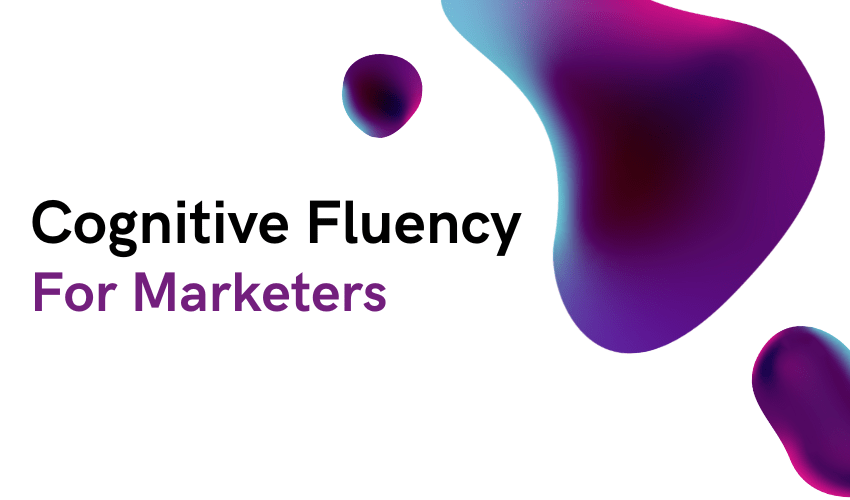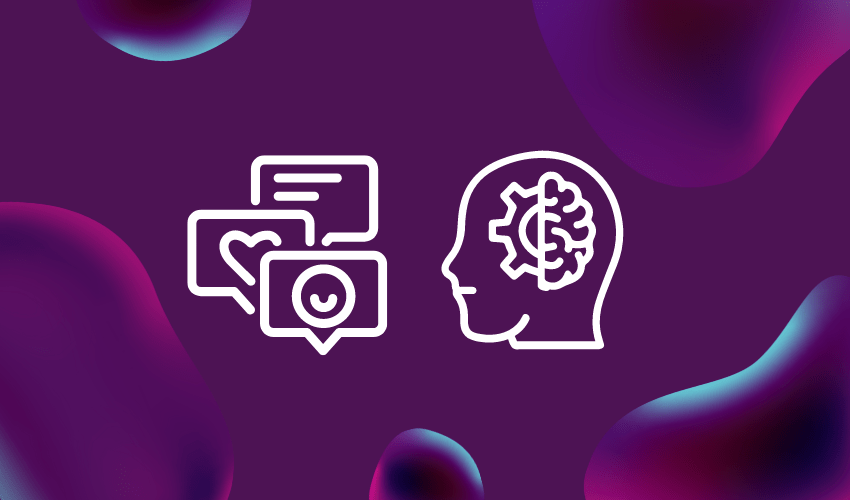A Marketers Guide to Cognitive Fluency

Cognitive fluency is a critical concept for marketers, influencers, and bloggers to understand; due to its significant impact on how audiences perceive and respond to content and marketing messages.
What is Cognitive Fluency?
Cognitive fluency refers to the ease with which our brains process information.
Making information easy for the brain to process in marketing is crucial for several key reasons:
- Enhanced Engagement: People are constantly bombarded with information, especially in the digital space. If information is easy to process, it's more likely to capture and retain the audience's attention amidst this information overload. Simplicity helps your audience quickly understand a message without expending excessive cognitive effort. (Note: Cognitive effort is often associated with feelings of stress, doubt and frustration).
- Improved Comprehension and Recall: Information that is easy to process is more readily understood and remembered by people. This is crucial in marketing. Especially when you want your audience to not only grasp your message quickly but also recall it later. Simplified, clear messaging is more likely to stick in the minds of consumers.
- Increased Persuasiveness: Information that is cognitively fluent - that is, easy to think about - is often perceived as more truthful. In marketing, this means that straightforward and easy to understand messaging is more likely to be convincing and credible in the eyes of your audience.
- Positive Brand Perception: When information from a brand is consistently easy to understand, it contributes to a positive user experience. This positive interaction will often enhance the overall perception of the brand, leading to increased trust and loyalty.
- Faster Decision Making: In a fast-paced world, consumers often make quick decisions. If the marketing message is clear and easy to process, it can speed up the decision-making process. This is particularly important in scenarios like online shopping, where a straightforward call to action can significantly impact conversion rates ... especially critical when alternative options are a click away.
- Better Accessibility: Making information easy to process also makes it more accessible to a broader audience. Consider those whose first language differs from the language of your content and the cognitive load to interprete. Marketing that is easily understood by a person is often easier to translate by a human translator, bot, AI or app.
- Alignment with Digital Trends: In the digital realm, where scrolling is the norm, and attention spans are short, ease of information processing is vital. Content that gets to the point and is easy to digest is more likely to perform well in these environments.
Why Understanding Cognitive Fluency is Crucial for Marketers
Understanding cognitive fluency is crucial for marketers as it directly impacts how effectively they can communicate with and influence their target audience.
Messages that are cognitively fluent are consistently found to be more engaging and lead to higher conversion rates; because your audience are more likely to pay attention to and respond positively to a call-to-action that is clear, concise, and easy to follow.
On the other hand, if a marketing message is complex or difficult to understand, it raises doubts or skepticism. For marketers, this means avoiding difficult language and converting it into straightforward and clear messaging that is more persuasive; which will enhance a brand's trustworthiness in the eyes of customers and positively influence buying decisions.
In SEO and search engine marketing, where algorithms dictate content visibility, cognitive fluency has been found to impact how content is ranked and displayed. Search engines tend to favour content that provides a "good user experience". Cognitively fluent content is often well-structured and clear, which aligns with the preferences of search engines, so it tends to rank higher in search engine results.
Cognitive fluency also involves the use of visuals and design elements to complement textual information, making complex ideas more digestible and engaging through visual storytelling. In the context of social media marketing, where sharing can significantly increase reach, this makes it particularly important.

When to Use Cognitive Fluency in Marketing
Cognitive fluency should be a foundational element in virtually all marketing materials, but its application can be particularly crucial in specific scenarios:
- Website Design:
- Use: Simplify navigation and content presentation.
- Example: A website with a clean layout, clear headings, and concise content facilitates easy browsing, enhancing user experience and retention.
- Social Media Posts:
- Use: Create straightforward, easily digestible posts.
- Example: A social media post with a clear image and a caption like "Transform your mornings with our quick, healthy breakfast solutions!" is straightforward and engaging.
- Email Marketing:
- Use: Craft clear, concise subject lines and body content.
- Example: An email subject line saying, "Unlock 20% Off Your Next Purchase - Today Only!" is direct and encourages immediate opening.
- Product Descriptions:
- Use: Use simple language to describe products.
- Example: A product description like, "Experience superior comfort with our 100% cotton, breathable summer wear" is easy to understand and highlights key product features.
- Advertisements:
- Use: Ensure ad copy is straightforward and appealing.
- Example: An ad stating, "Get Fit in Just 15 Minutes a Day" clearly communicates the benefit in a simple manner.
- CTAs (Calls to Action):
- Use: Make CTAs direct and action-oriented.
- Example: A CTA like, "Start Your Free Trial Now" is effective because it's clear and prompts immediate action.
- Instructions and Guides:
- Use: Offer clear, step-by-step instructions.
- Example: A how-to guide that begins with, "Easy 3-Step Installation" reassures users of the simplicity of the process.
- Content Marketing:
- Use: Write blog posts and articles that are easy to read and understand.
- Example: A blog post titled "5 Simple Tips to Improve Your Photography Skills" with well-structured content and simple language caters to cognitive fluency.
- Reporting and Data Presentation:
- Use: Present data in a clear, visually appealing format.
- Example: Using infographics to represent complex data in an annual report makes it more comprehensible for the reader.
- Brand Messaging and Slogans:
- Use: Develop brand slogans that are catchy yet simple.
- Example: A slogan like "Just Do It" by Nike is memorable due to its simplicity and directness.
- Crisis Communication: In times of crisis or when addressing sensitive issues, cognitive fluency is crucial to ensure your message is understood clearly and correctly, minimizing the chances of misinterpretation.
- Cross-Cultural Marketing: In marketing campaigns that target diverse audiences or span across different cultures, cognitive fluency is important for ensuring that your message transcends cultural barriers and is easily understood by all.
How Cognitive Fluency can be Used to Improve CTAs
Cognitive fluency can significantly enhance a call to action (CTA) by making it simpler, clearer, and more direct - reducing the mental effort required for the audience to process the information. This is achieved by using straightforward language, action-oriented verbs, and a clear, concise message that directly communicates a desirable action for the reader to take.
For example, instead of a complex and wordy CTA like "We invite you to proceed if you wish to receive further updates from us," a cognitively fluent alternative could be "Subscribe now for updates!" This streamlined approach not only makes the CTA easier to understand but also more effective in prompting an immediate response.
In the majority of scenarios, by reducing cognitive load, the audience is more likely to engage with the content and follow through with the intended action, leading to higher conversion rates and better marketing outcomes.
Examples in Applying Cognitive Fluency
- Before: "If you find yourself interested in enhancing your culinary skills, we'd like invite you to consider joining our comprehensive online cooking course."
- After: "Improve your cooking skills - Join our online course today!"
- Before: "It is with great excitement that we extend an invitation to test trial of our latest financial software, a tool that has the potential to revolutionize your approach to personal finance management."
- After: "Revolutionize your finances with our new software. Try it now!"
- Before: "We’re offering an opportunity for those who may be interested in subscribing to our newsletter (which provides insights and information on the latest trends in digital marketing), and get access to this valuable resource."
- After: "Stay ahead in digital marketing - Subscribe to our newsletter for the latest trends!"
The Benefits of Using Cognitive Fluency in Marketing
Mastering cognitive fluency in marketing offers substantial benefits to a marketer, both in terms of career advancement and the effectiveness of their marketing initiatives:
- Enhanced Campaign Performance: Utilizing cognitive fluency enables marketers to create more impactful and successful campaigns. Clear, easily digestible messaging resonates better with audiences, leading to higher engagement rates, improved click-through rates, and increased conversions. These tangible results from marketing initiatives directly reflect on the marketer's ability to drive success.
- Increased Credibility and Reputation: By consistently producing effective, fluent content and campaigns, a marketer can build a reputation for efficiency and effectiveness. This reputation enhances their credibility both within their organization and in the wider marketing community, potentially opening doors to new opportunities and career growth.
- Skill Demonstration in a Complex Digital Landscape: The digital marketing landscape is crowded and complex. The ability to distill complex ideas into simple, compelling messages is a highly valued skill. Marketers who excel in cognitive fluency demonstrate their capacity to adapt and convey messages in a manner that cuts through the noise, a key competency in the digital age.
- Improved Data Interpretation and Strategy Development: Cognitive fluency isn't just about external communication; it also involves the ability to process and interpret data efficiently. Marketers skilled in this area can quickly derive insights from customer data and market trends, enabling them to develop more effective strategies and make informed decisions.
- Better Collaboration and Leadership: Marketers who practice cognitive fluency often become better communicators overall. This clarity in communication is beneficial in collaborative environments and is a crucial skill for leadership roles. Being able to articulate strategies, concepts, and results clearly makes them effective leaders and team players.
- Customer-Centric Approach: A focus on cognitive fluency aligns a marketer's approach with the needs and preferences of the target audience. This customer-centric approach is fundamental in modern marketing and helps in building stronger connections with customers, ultimately leading to brand loyalty and long-term success.
- Adaptability to Global Markets: Marketers adept in cognitive fluency are better equipped to adapt their strategies for global markets. They can effectively tailor messaging to diverse audiences, ensuring relevancy and comprehension across different cultures and languages.
- Advantage in Competitive Job Markets: In a competitive job market, expertise in cognitive fluency can set a marketer apart from their peers. It showcases their ability to create impactful, user-friendly content and campaigns, a skill highly sought after by employers.

